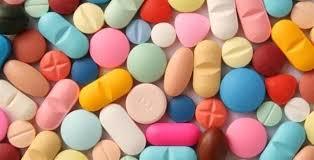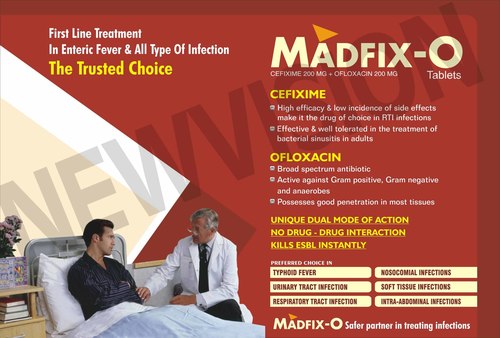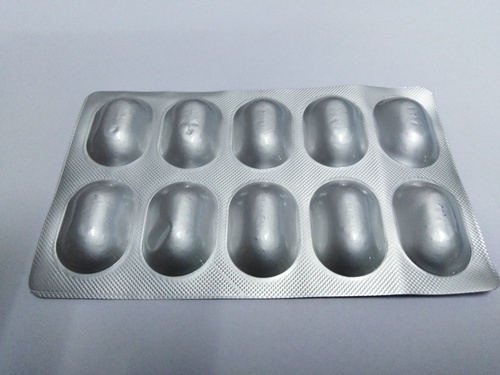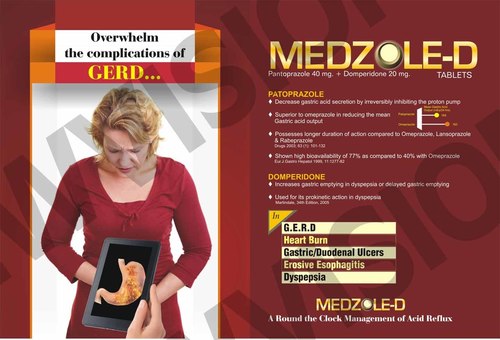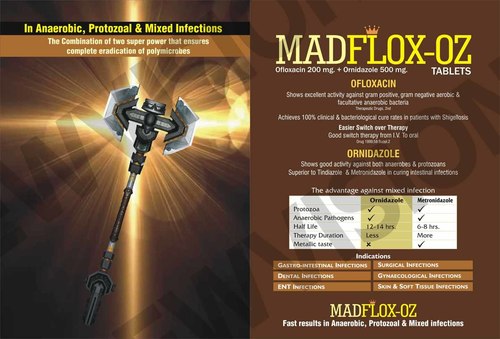
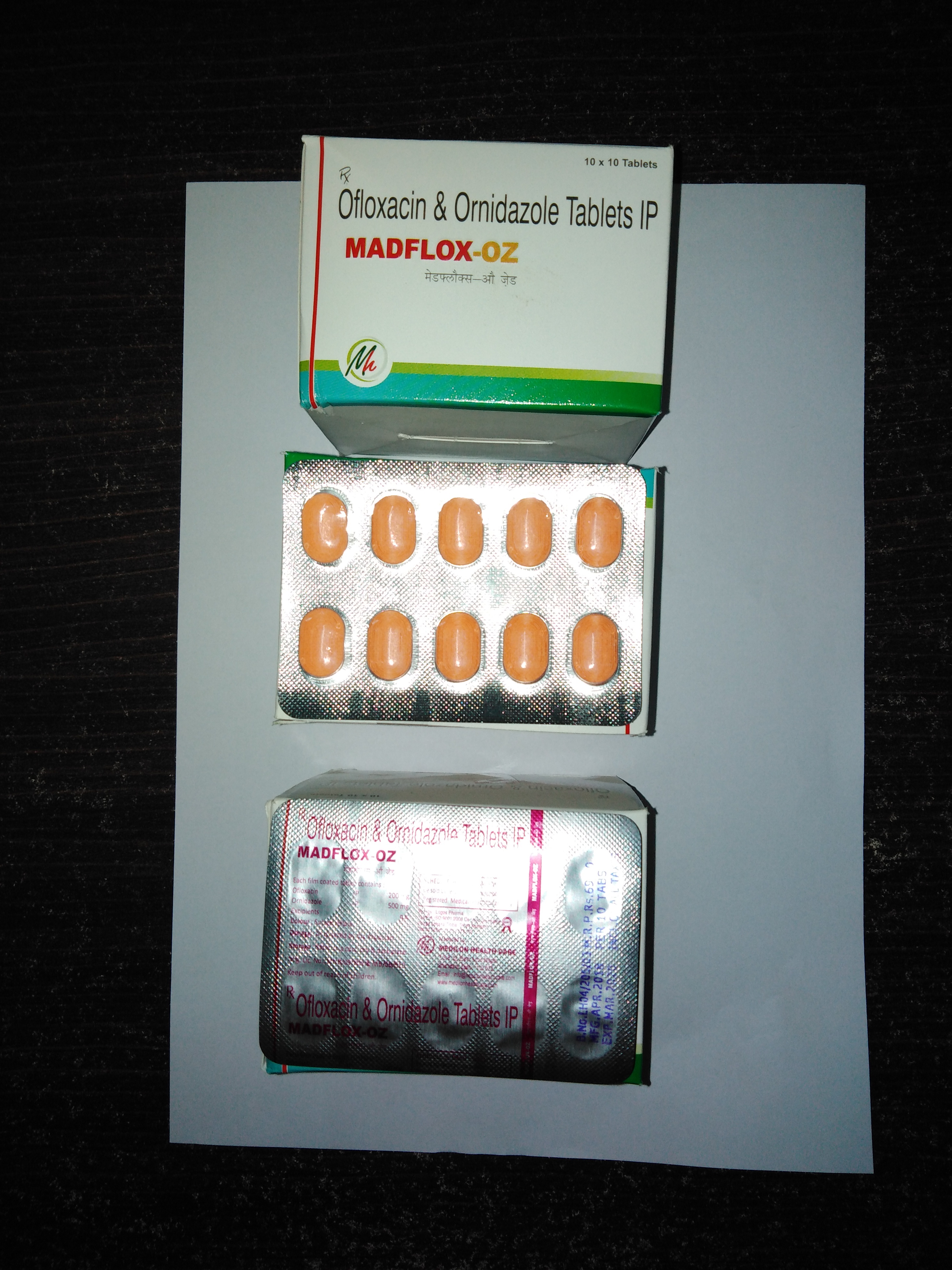
Ofloxacin Tablets
Product Details:
- Drug Type Generic Drugs
- Ingredients Ofloxacin Ornidazole Tablet - Composition and Active Ingredients Ofloxacin Ornidazole Tablet is composed of the following active ingredients (salts) Ofloxacin - 200 MG Ornidazole - 500 MG
- Physical Form Tablets
- Recommended For Suitable For All
- Dosage As directed by the Physician
- Dosage Guidelines After Food
- Quantity 500 Boxes
- Click to View more
Ofloxacin Tablets Price And Quantity
- 500 Box
- 1.00 - 1.00 INR
- 95 INR
Ofloxacin Tablets Product Specifications
- Ofloxacin Ornidazole Tablet - Composition and Active Ingredients Ofloxacin Ornidazole Tablet is composed of the following active ingredients (salts) Ofloxacin - 200 MG Ornidazole - 500 MG
- store in a cool & dry ,dark plase
- 500 Boxes
- Suitable For All
- After Food
- Tablets
- As directed by the Physician
- Generic Drugs
Ofloxacin Tablets Trade Information
- AS PER MARKET DEMANDS Per Day
- 30/45 Days
- Within a certain price range free samples are available
- 10*10
- All India
- Drug Licence, WHO GMP Certified, FSSAI,
Product Description
This Ofloxacin Tablet is utilized to treat an assortment of bacterial diseases. Ofloxacin has a place with a class of medications called quinolone anti-microbials. It works by halting the development of microscopic organisms. This anti-toxin treats just bacterial diseases. Ofloxacin Tablet won't work for viral contaminations, (for example, normal chilly, influenza). Pointless utilize or abuse of any anti-infection can prompt its diminished adequacy. This is utilized to treat external ear contaminations (swimmer's ear or ear canal infections) and center ear diseases.
Uses
This medication is used to treat a variety of bacterial infections. Ofloxacin belongs to a class of drugs called quinolone antibiotics. It works by stopping the growth of bacteria.
This antibiotic treats only bacterial infections. It will not work for viral infections (such as common cold, flu). Using any antibiotic when it is not needed can cause it to not work for future infections.
How to use Ofloxacin
Read the Medication Guide provided by your pharmacist before you start taking ofloxacin and each time you get a refill. If you have any questions, ask your doctor or pharmacist.
Take this medication by mouth with or without food as directed by your doctor, usually twice a day (every 12 hours). The dosage and length of treatment is based on your medical condition and response to treatment.
Drink plenty of fluids while taking this medication unless your doctor tells you otherwise.
Take this medication at least 2 hours before or 2 hours after taking other products that may bind to it, decreasing its effectiveness. Ask your pharmacist about the other products you take. Some examples include: quinapril, sucralfate, vitamins/minerals (including iron and zinc supplements), and products containing magnesium, aluminum, or calcium (such as antacids, didanosine solution, calcium supplements).
For the best effect, take this antibiotic at evenly spaced times. To help you remember, take this medication at the same time(s) every day.
Continue to take this medication until the full prescribed amount is finished, even if symptoms disappear after a few days. Stopping the medication too early may result in a return of the infection.
See also Warning section.
Upset stomach, nausea, diarrhea,, dizziness, lightheadedness, or trouble sleepingmay occur. If any of these effects persist or worsen, tell your doctor or pharmacist promptly.
Remember that your doctor has prescribed this medication because he or she has judged that the benefit to you is greater than the risk of side effects. Many people using this medication do not have serious side effects.
Tell your doctor right away if you have any serious side effects, including: easy bruising/bleeding, signs of a new infection (such as new/persistent fever, persistent sore throat), signs of kidney problems (such as change in the amount of urine), signs of liverproblems (such as unusual tiredness, stomach/abdominal pain, persistent nausea/vomiting, yellowing eyes/skin, dark urine).
Get medical help right away if you have any very serious side effects, including: hearing changes, unsteadiness, severe dizziness, fainting, fast/irregular heartbeat.
This medication may rarely cause a severe intestinal condition (Clostridium difficile-associated diarrhea) due to a type of resistant bacteria. This condition may occur during treatment or weeks to months after treatment has stopped. Tell your doctor right away if you develop: persistent diarrhea, abdominal or stomach pain/cramping, blood/mucus in your stool.
Do not use anti-diarrhea or opioid medications if you have any of these symptoms because these products may make them worse.
Use of this medication for prolonged or repeated periods may result in oral thrush or a new yeast infection. Contact your doctor if you notice white patches in your mouth, a change in vaginal discharge, or other new symptoms.
A very serious allergic reaction to this drug is rare. However, get medical help right away if you notice any symptoms of a serious allergic reaction, including: rash, itching/swelling (especially of the face/tongue/throat), severe dizziness, trouble breathing.
This is not a complete list of possible side effects. If you notice other effects not listed above, contact your doctor or pharmacist.
Precautions
See also Warning section.
Before taking ofloxacin, tell your doctor or pharmacist if you are allergic to it; or to other quinolone antibiotics (such as ciprofloxacin, levofloxacin); or if you have any other allergies. This product may contain inactive ingredients, which can cause allergic reactions or other problems. Talk to your pharmacist for more details.
Before using this medication, tell your doctor or pharmacist your medical history, especially of: seizure disorder, conditions that increase your risk of seizures (such as brain/head injury, brain tumors), nerve problems (such as peripheral neuropathy), kidney disease, liver disease, mental/mood disorders (such as depression), myasthenia gravis, joint/tendon problems (such as tendonitis, bursitis).
Ofloxacin may cause a condition that affects the heart rhythm (QT prolongation). QT prolongation can rarely cause serious (rarely fatal) fast/irregular heartbeat and other symptoms (such as severe dizziness, fainting) that need medical attention right away.
The risk of QT prolongation may be increased if you have certain medical conditions or are taking other drugs that may cause QT prolongation. Before using ofloxacin, tell your doctor or pharmacist of all the drugs you take and if you have any of the following conditions: certain heart problems (heart failure, slow heartbeat, QT prolongation in the EKG), family history of certain heart problems (QT prolongation in the EKG, sudden cardiac death).
Low levels of potassium or magnesium in the blood may also increase your risk of QT prolongation. This risk may increase if you use certain drugs (such as diuretics/"water pills") or if you have conditions such as severe sweating, diarrhea, or vomiting. Talk to your doctor about using ofloxacin safely.
This medication may rarely cause serious changes in blood sugar, especially if you have diabetes. Check your blood sugar regularly as directed and share the results with your doctor. Watch for symptoms of high blood sugar, such as increased thirst/urination. Also watch for symptoms of low blood sugar such as sudden sweating, shaking, fast heartbeat, hunger, blurred vision, dizziness, or tingling hands/feet. It is a good habit to carry glucose tablets or gel to treat low blood sugar. If you don't have these reliable forms of glucose, rapidly raise your blood sugar by eating a quick source of sugar such as table sugar, honey, or candy, or by drinking fruit juice or non-diet soda. Tell your doctor right away about the reaction and the use of this product. To help prevent low blood sugar, eat meals on a regular schedule, and do not skip meals. Your doctor may need to switch you to another antibiotic or adjust your diabetesmedications if any reaction occurs.
This drug may make you dizzy. Alcohol or marijuana can make you more dizzy. Do not drive, use machinery, or do anything that needs alertness until you can do it safely. Limit alcoholicbeverages. Talk to your doctor if you are using marijuana.
Ofloxacin may cause live bacterial vaccines (such as typhoid vaccine) to not work as well. Do not have any immunizations/vaccinations while using this medication unless your doctor tells you to.
This medication may make you more sensitive to the sun. Limit your time in the sun. Avoid tanning booths and sunlamps. Use sunscreen and wear protective clothing when outdoors. Tell your doctor right away if you get sunburned or have skin blisters/redness.
Before having surgery, tell your doctor or dentist about all the products you use (including prescription drugs, nonprescription drugs, and herbal products).
Children may be more sensitive to the side effects of this drug, especially joint/tendon problems.
Older adults may be more sensitive to the side effects of this drug, such as tendon problems (especially if they are also taking corticosteroids such as prednisone or hydrocortisone) and QT prolongation (see above).
During pregnancy, this medication should be used only when clearly needed. Discuss the risks and benefits with your doctor.
This medication passes into breast milk. Consult your doctor before breast-feeding.
Other Products in 'Pharma Tablets' category
 |
MEDILON HEALTHCARE
All Rights Reserved.(Terms of Use) Developed and Managed by Infocom Network Private Limited. |
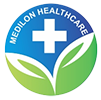
 Send Inquiry
Send Inquiry
